Collaborating with Customers to Achieve Corporate Strategy—How Small Steps Can Lead to Large Impact
 Healthcare systems worldwide are criticized for falling short of expectations, and countries like the U.S. which feature aging populations, are rapidly approaching a crisis. Demand and cost will grow, but the system as currently structured will certainly break down unless radical changes are made. Web 2.0’s disruptive potential can be part of the remedy: we need to introduce much more accountability and collaboration into all parts of the system. We need to change the paternalistic attitudes that pervade the system, treat patients as active participants and encourage everyone to be more accountable. This series introduces healthcare Web 2.0 innovators. Healthcare systems worldwide are criticized for falling short of expectations, and countries like the U.S. which feature aging populations, are rapidly approaching a crisis. Demand and cost will grow, but the system as currently structured will certainly break down unless radical changes are made. Web 2.0’s disruptive potential can be part of the remedy: we need to introduce much more accountability and collaboration into all parts of the system. We need to change the paternalistic attitudes that pervade the system, treat patients as active participants and encourage everyone to be more accountable. This series introduces healthcare Web 2.0 innovators.
CDC Business Drivers
CDC’s charter is to protect public health. The agency serves as a resource to mitigate the impact of infectious diseases, environmental health, bioterrorism and others. It fulfils its mission by connecting with people and educating the public; it seeks to partner with people to increase their knowledge of health hazards and how to respond appropriately in the face of threats.
[…]
Knowledge Economy Unfolds via All Things Digital-Social—Wearing Passion and Personality on Your Sleeve
Discerning Web 2.0 from Web 1.0—Ron May Gets Comeuppance as Happy and Successful
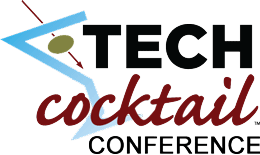 Web 2.0 entrepreneurs, financiers and professional services folk descended on Loyola University Chicago’s Lewis Hall 29 May 2008 for “Tech Conference,” TechCocktail’s first ever day-long educational event. Founders Frank Gruber and Eric Olson served an effervescent yet heady elixir of heart-to-heart war stories, lessons learned and strategies by entrepreneurs, venture capitalists, lawyers, accountants and an executive coach. Web 2.0 entrepreneurs, financiers and professional services folk descended on Loyola University Chicago’s Lewis Hall 29 May 2008 for “Tech Conference,” TechCocktail’s first ever day-long educational event. Founders Frank Gruber and Eric Olson served an effervescent yet heady elixir of heart-to-heart war stories, lessons learned and strategies by entrepreneurs, venture capitalists, lawyers, accountants and an executive coach.
Since attending TechCocktail 1 in July 2006, I have promoted the periodic TechCocktail “meetups” to everyone who will listen as the place to learn about and connect with Web 2.0 players and technology in Chicago (elsewhere now, too). Frank and Eric have created one of the most worthwhile groups and communities in the city and were recognized in the ITA’s Citylights this year. Their first conference was both high value and quintessentially Web 2.0: speakers were open about what had worked and what hadn’t. The program was well balanced, organized and entertaining. There were considerable lessons for […]
Geography 3.0, What It Is and What It Means predicts a new synthesis in the Knowledge Economy—fast forward to the past—Plus, the fire
 Noodles are largely driven by intuition and holistic mental doodling, and this one has been simmering a long time*. I believe that there is profound meaning in virtual and literal “mobility,” and I’ll explore its significance in terms geography and human relationships. Geography has always had a profound impact on how humans have lived and the organizations in which we have lived, and when its meaning shifts, our lives are transformed. This is of paramount importance because human relationships are currently transitioning from geography-based to interest-based. Many governments and businesses harbor business rules that assume geography-based relationships, and, unless they appreciate the shift to interest-based relationships, they will experience disruption’s spin cycle. Lose a turn. Don’t pass go ,^) Noodles are largely driven by intuition and holistic mental doodling, and this one has been simmering a long time*. I believe that there is profound meaning in virtual and literal “mobility,” and I’ll explore its significance in terms geography and human relationships. Geography has always had a profound impact on how humans have lived and the organizations in which we have lived, and when its meaning shifts, our lives are transformed. This is of paramount importance because human relationships are currently transitioning from geography-based to interest-based. Many governments and businesses harbor business rules that assume geography-based relationships, and, unless they appreciate the shift to interest-based relationships, they will experience disruption’s spin cycle. Lose a turn. Don’t pass go ,^)
Before exploring how these things will unfold in Part II, let’s review three geographies and four economies here in Part I…
[…]
IBM Drives Enterprise Adoption of Social Networks with New Enterprise Adaptability Practice offers reportage on the launch of IBM’s enterprise adaptability practice
Shades of Web 3.0—The Googlization of Knowledge Management—Resetting the Adoption Clocks
 Tuesday IBM announced a new services practice, “Enterprise Adaptability” services, which aims to help global companies realize a quantum leap in workforce agility and collaboration by facilitating their adoption of social networks and Web 2.0. As predicted in the Year in Review—2007, social networks and Web 2.0 are being embraced in the enterprise B2B arena this year, and this announcement shows that adoption is right on ahead of schedule. Enterprise 2.0 is reaching the mainstream, and companies that do not aggressively adopt enterprise 2.0 will experience serious competitive threats within three years. Tuesday IBM announced a new services practice, “Enterprise Adaptability” services, which aims to help global companies realize a quantum leap in workforce agility and collaboration by facilitating their adoption of social networks and Web 2.0. As predicted in the Year in Review—2007, social networks and Web 2.0 are being embraced in the enterprise B2B arena this year, and this announcement shows that adoption is right on ahead of schedule. Enterprise 2.0 is reaching the mainstream, and companies that do not aggressively adopt enterprise 2.0 will experience serious competitive threats within three years.
IBM’s announcement validates enterprise social networking, but more significant is their rationale for launching the practice: their clients are struggling with adjusting to the Knowledge Economy, globalization and decreasing margins, and Enterprise Adaptability prescribes collaboration and innovation to cure legendary agility gaps. As explained below, Enterprise Adaptability smells like breakthrough, although it’s barely out of the oven. To look behind the curtain, I caught up with […]
“Yes,” Says Team of Healthcare Experts, Employer CEOs and Patient Representative at the Executives’ Club of Chicago, “But You Must Change Your Ways”
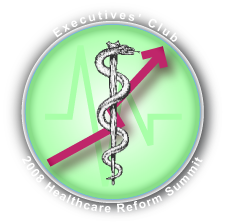 Honestly Assessing Quality—Engaging Consumer Empowerment—Trading in the Ferrari for a Chevy Honestly Assessing Quality—Engaging Consumer Empowerment—Trading in the Ferrari for a Chevy
The Executives’ Club of Chicago convened its healthcare reform summit at the Hilton Chicago on 20 February 2008, drawing on diverse expertise. Ian Morrison, Ph.D., healthcare futurist, gave the keynote and moderated two panels: first, the healthcare expertise panel with Dean Harrison, CEO Northwestern Memorial Healthcare; William Novelli, CEO AARP; Scott P. Serota, CEO BlueCross BlueShield Association; and second, the business executive panel with Andrew M. Appel, Chairman AON Consulting; John A. Edwardson, CEO, CDW; John B. Menzer, Vice Chairman and Administrative Officer, Wal-Mart Stores. Robert L. Parkinson, CEO, Baxter Healthcare gave an insightful point of view on recommended actions to close the event.
There was broad agreement that the U.S. healthcare system was broken, and speakers offered excellent insights and perspectives about how to fix the system. However, what they didn’t say was as interesting as what they did, and I will address two key issues in […]
Web 2.0 Impact on 2008 U.S. Presidential Election Declared Minimal at Executives’ Club, but cantankerous subtext hints at possible monkey wrench—democratic race in spotlight.
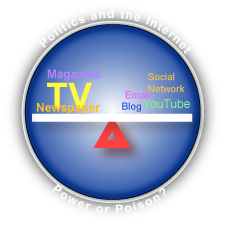 The Executives’ Club of Chicago fielded an expert panel to brief Midwest executives on Web 2.0’s current and likely impact on one of the most watched U.S. elections in recent history. Marie Cocco, a renowned political columnist, Peter Greenburger, Director of Google’s Elections & Issue Advocacy Team, and Alan Webber, Senior Analyst of Forrester Research brought to bear diverse perspectives on the question at the event, which took place at The University Club on January 31, 2008. The Executives’ Club of Chicago fielded an expert panel to brief Midwest executives on Web 2.0’s current and likely impact on one of the most watched U.S. elections in recent history. Marie Cocco, a renowned political columnist, Peter Greenburger, Director of Google’s Elections & Issue Advocacy Team, and Alan Webber, Senior Analyst of Forrester Research brought to bear diverse perspectives on the question at the event, which took place at The University Club on January 31, 2008.
They produced a logical conclusion, namely that Web 2.0 was a force in the making but that it would probably not be a decisive factor this year. The session was graciously co-hosted by Communications Committee Co-Chairs David Prosperi, Vice President Global Public Relations, AON and David Blake, Publisher of Crain’s Chicago Business.
As usual, I will share my notes of speakers’ remarks before adding my between the lines analysis and conclusions. As an […]
U.S. Economy Due for Sideways Year—Special Effects by Presidential Election—Uncomfortable Long-term Questions Waiting in Wings
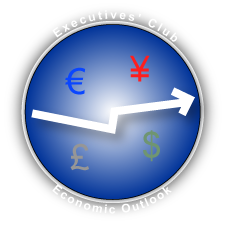 The Executives’ Club of Chicago assembled an all-star panel to give Midwest business leaders their guidance for various aspects of the U.S. economy in 2008. Diane Swonk, Chief Economist of Mesirow Financial and Robert “Bob” Froehlich, Chairman of the Investment Strategy Committee, Deutsche Asset Management returned, and the mystery panelist was Jack Ablin, Chief Investment Officer, Harris Private Bank. They broke out their respective crystal balls for 2008, along with comedic effects. The session was brilliantly moderated by Terry Savage, Financial Columnist of the Chicago Sun-Times who didn’t miss a beat and extracted specific predictions from panelists. The Executives’ Club of Chicago assembled an all-star panel to give Midwest business leaders their guidance for various aspects of the U.S. economy in 2008. Diane Swonk, Chief Economist of Mesirow Financial and Robert “Bob” Froehlich, Chairman of the Investment Strategy Committee, Deutsche Asset Management returned, and the mystery panelist was Jack Ablin, Chief Investment Officer, Harris Private Bank. They broke out their respective crystal balls for 2008, along with comedic effects. The session was brilliantly moderated by Terry Savage, Financial Columnist of the Chicago Sun-Times who didn’t miss a beat and extracted specific predictions from panelists.
Panelists agreed that the U.S. economy would struggle in 2008, but it would move mostly sideways, probably eking out a 1-2% gain for the year after an unsatisfying first half. All panelists predicted that the Dow would touch 14,000 sometime during the year. Froehlich again emphasized the importance of looking beyond the U.S. for investments. Swonk and Ablin were less outspoken but had high non-U.S. allocations in their recommended […]
Year in Review 2007—Editor’s Choice of the Global Human Capital Journal
 As I reflect on 2007 and create strategy for 2008, several macro-trends come into sharp relief, and I believe that some of them might be helpful to you as you conduct your own planning. As always, I focus on emerging phenomena because they are areas in which disruption and discontinuous change are acting on markets, thereby elevating threats and opportunities. Helping leaders to create strategy to manage the risk of unusual market developments is the focus of my consulting practice. As I reflect on 2007 and create strategy for 2008, several macro-trends come into sharp relief, and I believe that some of them might be helpful to you as you conduct your own planning. As always, I focus on emerging phenomena because they are areas in which disruption and discontinuous change are acting on markets, thereby elevating threats and opportunities. Helping leaders to create strategy to manage the risk of unusual market developments is the focus of my consulting practice.
In 2007 it became clear to me that we were entering a profound social transformation that would produce an unimaginable degree of change. Unlike the technology-precipitated change that I’ve been helping people with since the 1990s, technology is shifting to the background now, and pervasive social change is taking the stage. Look for disruption in all areas affected by how people connect, communicate, purchase and collaborate: business, politics, community and leisure. Moreover, these changes are completely global with all the variations that engenders.
I can’t tell […]
How Social Tagging Changes the Economics of Ecommerce was a geeky session that explained how a potent mix of “people like me” navigation and digital leverage can drive sales and profits + The secret to emerging markets?
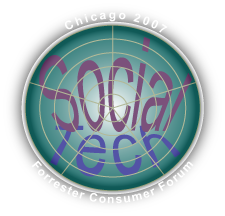 The Global Human Capital Journal’s coverage of the Forrester Consumer Forum 2007 continues with this session on social tagging. Before your eyes glaze over, bear with me and learn how this simple, revolutionary social technology can help your customers to help your business. Forrester’s Sarah Rotman Epps moderated a discussion with Brian Rosenblat, Online Retail Industry Lead, Endeca Technologies and Jay Shaffer, Vice President Marketing, PowerReviews, who represented companies that offer social tagging solutions, and they all shared numerous examples. The Global Human Capital Journal’s coverage of the Forrester Consumer Forum 2007 continues with this session on social tagging. Before your eyes glaze over, bear with me and learn how this simple, revolutionary social technology can help your customers to help your business. Forrester’s Sarah Rotman Epps moderated a discussion with Brian Rosenblat, Online Retail Industry Lead, Endeca Technologies and Jay Shaffer, Vice President Marketing, PowerReviews, who represented companies that offer social tagging solutions, and they all shared numerous examples.
This was one of the most “actionable opportunity” sessions of the conference: tagging is a relatively unknown, simple, yet transformational Web 2.0 phenomenon that will gain traction in 2008 and explode in 2009. If you aren’t doing it, you will be at a significant disadvantage to your competitors who do.
The Global Human Capital Journal published the overall conference […]
… Risky, Loaded and Ready to Help You Improve Your Business
 The Global Human Capital Journal’s coverage of the Forrester Consumer Forum 2007 continues with this session on the disruptive power of customers’ Web 2.0 activity. Charlene Li, Vice President and Principal Analyst, Forrester Research, briefed the conference on the disruptive character of consumer empowerment, which she and Josh Bernoff call “groundswell.” She explained why customers were revolting, a “ladder of participation” to describe who is driving the change and some suggestions for turning revolt into reform. The Global Human Capital Journal’s coverage of the Forrester Consumer Forum 2007 continues with this session on the disruptive power of customers’ Web 2.0 activity. Charlene Li, Vice President and Principal Analyst, Forrester Research, briefed the conference on the disruptive character of consumer empowerment, which she and Josh Bernoff call “groundswell.” She explained why customers were revolting, a “ladder of participation” to describe who is driving the change and some suggestions for turning revolt into reform.
The Global Human Capital Journal published the overall conference wrap as well as in-depth coverage of several sessions. Access all through the link to the conference logo (right). Other articles will be published in the days ahead, and we invite you to subscribe to the forum’s RSS feed to be notified as they are published.
I assume that the title’s double entendre was intentional, but in any case, it captures many marketers’ attitudes toward the so-called Web 2.0 revolution. “We don’t want our customers to change. We want to maintain our marketing […]
|
|
 Healthcare systems worldwide are criticized for falling short of expectations, and countries like the U.S. which feature aging populations, are rapidly approaching a crisis. Demand and cost will grow, but the system as currently structured will certainly break down unless radical changes are made. Web 2.0’s disruptive potential can be part of the remedy: we need to introduce much more accountability and collaboration into all parts of the system. We need to change the paternalistic attitudes that pervade the system, treat patients as active participants and encourage everyone to be more accountable. This series introduces healthcare Web 2.0 innovators.
Healthcare systems worldwide are criticized for falling short of expectations, and countries like the U.S. which feature aging populations, are rapidly approaching a crisis. Demand and cost will grow, but the system as currently structured will certainly break down unless radical changes are made. Web 2.0’s disruptive potential can be part of the remedy: we need to introduce much more accountability and collaboration into all parts of the system. We need to change the paternalistic attitudes that pervade the system, treat patients as active participants and encourage everyone to be more accountable. This series introduces healthcare Web 2.0 innovators.
 Web 2.0 entrepreneurs, financiers and professional services folk descended on Loyola University Chicago’s Lewis Hall 29 May 2008 for “Tech Conference,” TechCocktail’s first ever day-long educational event. Founders Frank Gruber and Eric Olson served an effervescent yet heady elixir of heart-to-heart war stories, lessons learned and strategies by entrepreneurs, venture capitalists, lawyers, accountants and an executive coach.
Web 2.0 entrepreneurs, financiers and professional services folk descended on Loyola University Chicago’s Lewis Hall 29 May 2008 for “Tech Conference,” TechCocktail’s first ever day-long educational event. Founders Frank Gruber and Eric Olson served an effervescent yet heady elixir of heart-to-heart war stories, lessons learned and strategies by entrepreneurs, venture capitalists, lawyers, accountants and an executive coach. Noodles are largely driven by intuition and holistic mental doodling, and this one has been simmering a long time*. I believe that there is profound meaning in virtual and literal “mobility,” and I’ll explore its significance in terms geography and human relationships. Geography has always had a profound impact on how humans have lived and the organizations in which we have lived, and when its meaning shifts, our lives are transformed. This is of paramount importance because human relationships are currently transitioning from geography-based to interest-based. Many governments and businesses harbor business rules that assume geography-based relationships, and, unless they appreciate the shift to interest-based relationships, they will experience disruption’s spin cycle. Lose a turn. Don’t pass go ,^)
Noodles are largely driven by intuition and holistic mental doodling, and this one has been simmering a long time*. I believe that there is profound meaning in virtual and literal “mobility,” and I’ll explore its significance in terms geography and human relationships. Geography has always had a profound impact on how humans have lived and the organizations in which we have lived, and when its meaning shifts, our lives are transformed. This is of paramount importance because human relationships are currently transitioning from geography-based to interest-based. Many governments and businesses harbor business rules that assume geography-based relationships, and, unless they appreciate the shift to interest-based relationships, they will experience disruption’s spin cycle. Lose a turn. Don’t pass go ,^) Tuesday IBM announced a new services practice, “Enterprise Adaptability” services, which aims to help global companies realize a quantum leap in workforce agility and collaboration by facilitating their adoption of social networks and Web 2.0. As predicted in the Year in Review—2007, social networks and Web 2.0 are being embraced in the enterprise B2B arena this year, and this announcement shows that adoption is right on ahead of schedule. Enterprise 2.0 is reaching the mainstream, and companies that do not aggressively adopt enterprise 2.0 will experience serious competitive threats within three years.
Tuesday IBM announced a new services practice, “Enterprise Adaptability” services, which aims to help global companies realize a quantum leap in workforce agility and collaboration by facilitating their adoption of social networks and Web 2.0. As predicted in the Year in Review—2007, social networks and Web 2.0 are being embraced in the enterprise B2B arena this year, and this announcement shows that adoption is right on ahead of schedule. Enterprise 2.0 is reaching the mainstream, and companies that do not aggressively adopt enterprise 2.0 will experience serious competitive threats within three years. Honestly Assessing Quality—Engaging Consumer Empowerment—Trading in the Ferrari for a Chevy
Honestly Assessing Quality—Engaging Consumer Empowerment—Trading in the Ferrari for a Chevy The Executives’ Club of Chicago fielded an expert panel to brief Midwest executives on Web 2.0’s current and likely impact on one of the most watched U.S. elections in recent history. Marie Cocco, a renowned political columnist, Peter Greenburger, Director of Google’s Elections & Issue Advocacy Team, and Alan Webber, Senior Analyst of Forrester Research brought to bear diverse perspectives on the question at the event, which took place at The University Club on January 31, 2008.
The Executives’ Club of Chicago fielded an expert panel to brief Midwest executives on Web 2.0’s current and likely impact on one of the most watched U.S. elections in recent history. Marie Cocco, a renowned political columnist, Peter Greenburger, Director of Google’s Elections & Issue Advocacy Team, and Alan Webber, Senior Analyst of Forrester Research brought to bear diverse perspectives on the question at the event, which took place at The University Club on January 31, 2008. The Executives’ Club of Chicago assembled an all-star panel to give Midwest business leaders their guidance for various aspects of the U.S. economy in 2008. Diane Swonk, Chief Economist of Mesirow Financial and Robert “Bob” Froehlich, Chairman of the Investment Strategy Committee, Deutsche Asset Management returned, and the mystery panelist was Jack Ablin, Chief Investment Officer, Harris Private Bank. They broke out their respective crystal balls for 2008, along with comedic effects. The session was brilliantly moderated by Terry Savage, Financial Columnist of the Chicago Sun-Times who didn’t miss a beat and extracted specific predictions from panelists.
The Executives’ Club of Chicago assembled an all-star panel to give Midwest business leaders their guidance for various aspects of the U.S. economy in 2008. Diane Swonk, Chief Economist of Mesirow Financial and Robert “Bob” Froehlich, Chairman of the Investment Strategy Committee, Deutsche Asset Management returned, and the mystery panelist was Jack Ablin, Chief Investment Officer, Harris Private Bank. They broke out their respective crystal balls for 2008, along with comedic effects. The session was brilliantly moderated by Terry Savage, Financial Columnist of the Chicago Sun-Times who didn’t miss a beat and extracted specific predictions from panelists. As I reflect on 2007 and create strategy for 2008, several macro-trends come into sharp relief, and I believe that some of them might be helpful to you as you conduct your own planning. As always, I focus on emerging phenomena because they are areas in which disruption and discontinuous change are acting on markets, thereby elevating threats and opportunities. Helping leaders to create strategy to manage the risk of unusual market developments is the focus of my consulting practice.
As I reflect on 2007 and create strategy for 2008, several macro-trends come into sharp relief, and I believe that some of them might be helpful to you as you conduct your own planning. As always, I focus on emerging phenomena because they are areas in which disruption and discontinuous change are acting on markets, thereby elevating threats and opportunities. Helping leaders to create strategy to manage the risk of unusual market developments is the focus of my consulting practice. The Global Human Capital Journal’s coverage of the Forrester Consumer Forum 2007 continues with this session on social tagging. Before your eyes glaze over, bear with me and learn how this simple, revolutionary social technology can help your customers to help your business. Forrester’s Sarah Rotman Epps moderated a discussion with Brian Rosenblat, Online Retail Industry Lead, Endeca Technologies and Jay Shaffer, Vice President Marketing, PowerReviews, who represented companies that offer social tagging solutions, and they all shared numerous examples.
The Global Human Capital Journal’s coverage of the Forrester Consumer Forum 2007 continues with this session on social tagging. Before your eyes glaze over, bear with me and learn how this simple, revolutionary social technology can help your customers to help your business. Forrester’s Sarah Rotman Epps moderated a discussion with Brian Rosenblat, Online Retail Industry Lead, Endeca Technologies and Jay Shaffer, Vice President Marketing, PowerReviews, who represented companies that offer social tagging solutions, and they all shared numerous examples. The Global Human Capital Journal’s coverage of the Forrester Consumer Forum 2007 continues with this session on the disruptive power of customers’ Web 2.0 activity. Charlene Li, Vice President and Principal Analyst, Forrester Research, briefed the conference on the disruptive character of consumer empowerment, which she and Josh Bernoff call “groundswell.” She explained why customers were revolting, a “ladder of participation” to describe who is driving the change and some suggestions for turning revolt into reform.
The Global Human Capital Journal’s coverage of the Forrester Consumer Forum 2007 continues with this session on the disruptive power of customers’ Web 2.0 activity. Charlene Li, Vice President and Principal Analyst, Forrester Research, briefed the conference on the disruptive character of consumer empowerment, which she and Josh Bernoff call “groundswell.” She explained why customers were revolting, a “ladder of participation” to describe who is driving the change and some suggestions for turning revolt into reform.